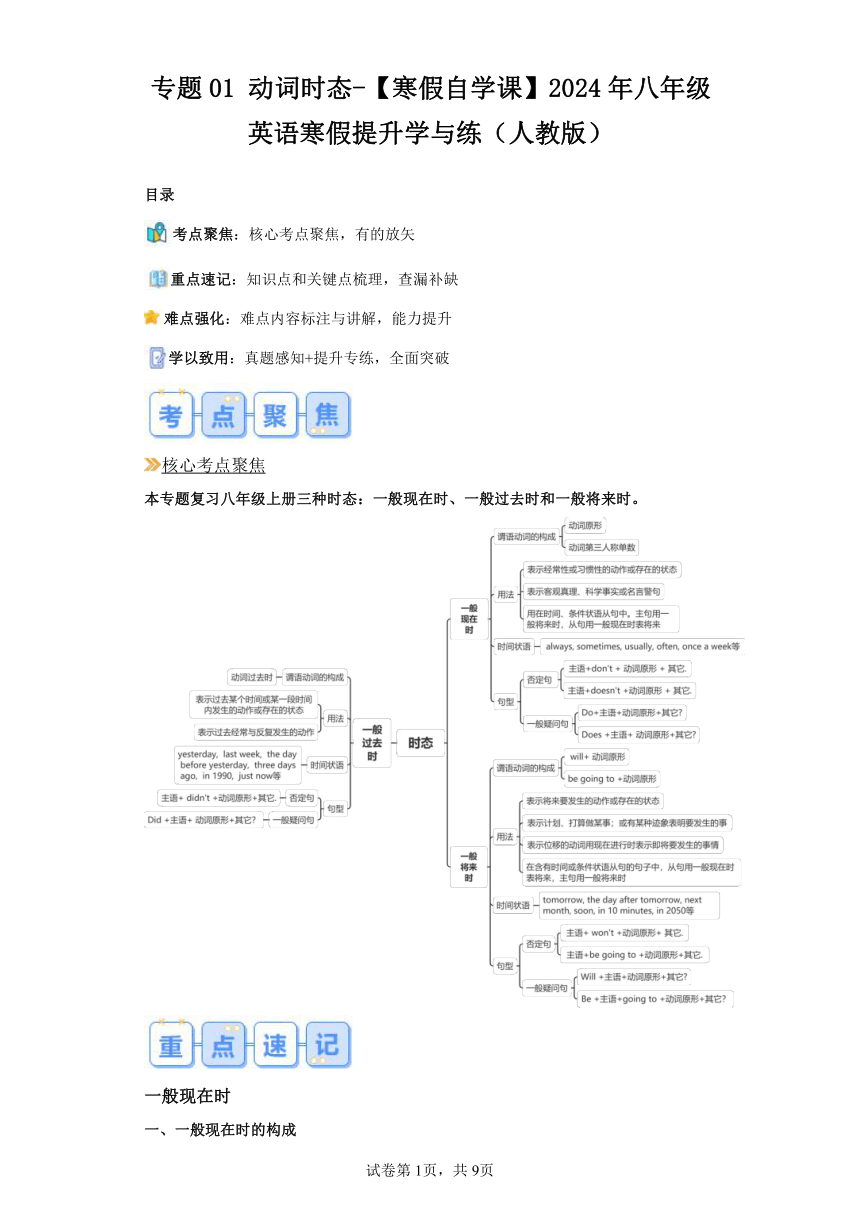
专题01 动词时态-【寒假自学课】2024年八年级英语寒假提升学与练(人教版) 目录 考点聚焦:核心考点聚焦,有的放矢 重点速记:知识点和关键点梳理,查漏补缺 难点强化:难点内容标注与讲解,能力提升 学以致用:真题感知+提升专练,全面突破 核心考点聚焦 本专题复习八年级上册三种时态:一般现在时、一般过去时和一般将来时。 一般现在时 一、一般现在时的构成 一般现在时主要用动词原形表示,如果主语是第三人称单数则用动词的第三人称单数形式。 二、一般现在时的用法 1. 表示经常性或习惯性的动作或存在的状态。 Eg. I usually get up at six in the morning. 我通常早上六点起床。 Mary goes to the movies three times a month. 玛丽一个月看三次电影。 2. 表示客观真理、科学事实或名言警句。 Eg. The earth goes around the sun. 地球绕着太阳转。 3. 用在时间、条件状语从句中。主句用一般将来时,从句用一般现在时表将来。 Eg. I’ll have a good time if I go to the party. (if引导条件状语从句) I will call you as soon as I arrive in London. (as soon as 引导时间状语从句) 4. 在某些以here, there开头的句子中,用一般现在时表示正在发生的动作。 Eg. There goes the bell. 铃响了。 三、与一般现在时连用的时间状语 1. always, sometimes, usually, often等表示频率的副词; 2. on Monday, on Saturday evening, in the morning, every day, every week等时间状语; 3. once a week, twice a month, three times a year等表示频率的词组。 四、基本结构 基本结构 否定句 一般疑问句 be 动词 am/is/are+not be动词提前,放于句首 行为动词 doesn’t/don’t+动词原形 Does/Do +主语+动词? Eg. Tom is a student. 否定句:Tom isn’t a student. 疑问句:Is Tom a student Mary likes English. 否定句:Mary doesn’t like English. 疑问句:Does Mary like English I go to school by bike. 否定句:I don’t go to school by bike. 疑问句:Do you go to school by bike 注意: 陈述句在变为疑问句时,第一人称I, we要变为第二人称you。 一般过去时 一、一般过去时的构成 一般过去时用动词的过去式表示。 二、一般过去时的用法 1. 表示过去某个时间或某一段时间内发生的动作或存在的状态。 Eg. He visited his grandparents last week. 上周他去看望他的祖父母了。 2. 表示过去经常与反复发生的动作,常和often, always 等频度副词连用。 Eg. He always went to work by bus last year. 去年他总是坐公交车去上班。 注意:表示过去经常发生的动作,也可以用“used to +动词原形”。 Eg. The river used to be clean, but now it’s full of rubbish. 这条河流过去非常干净,但现在满是垃圾。 三、与一般过去时连用的时间状语 yesterday, last week, the day before yesterday, three days ago, in 1990, just now, at the age of...等。 Eg. At the age of ten, she began to learn to play the piano. 十岁的时候,她开始学弹钢琴。 四、基本结构 基本结构 否定词 一般疑问句 be动词 was/were+not was或were提前,放于句首 行为动词 didn’t+do(动词原形) Did+主语+do(动词原形)... Eg. She was at home yesterday. 否定句:She was not at home yesterday. 疑问句:Was she at home yesterday He worked in a hospital last year. 否定句:He didn’t work in a hospital last year. 疑问句:Did he work in a hospital last year 一般过去时肯定句的过去式,规则动词加-ed,不规则的必须记。 否定形式疑问句,没有be加did。 如把did加在前,动词也要还原形。 一般将来时 一、一般将来时的构成 一般将来时 ... ...
~~ 您好,已阅读到文档的结尾了 ~~

